
The black bit at the end of a banana is not as gross as you might think
When you chow down on a banana, you might often see a black bit at the end and it looks a bit gross. But what is it? Some people think it is the seed, but these are found down the middle, if at all, as the Cavendish variety of bananas, which is commonly sold typically doesn’t produce any seeds. It is actually something completely different. Bananas are technically berries and the black bit is the nub of the flower from which the giant banana berry grew. Bananas grow on trees in bunches, and the end is actually the top of the fruit while the hard stalk is the bottom. But given most people eat bananas by snapping off the stalk first, the residual flower nub is left at the end. This black bit is entirely edible but people often throw it away because it has a tough texture and a bitter taste. So now you know, there is nothing stopping you from getting one of your five a day. Sign up to our free Indy100 weekly newsletter Have your say in our news democracy. Click the upvote icon at the top of the page to help raise this article through the indy100 rankings.
2023-09-14 20:17
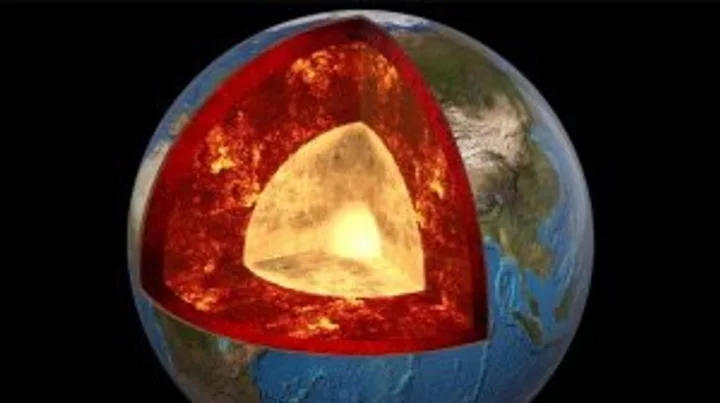
Copy of Science news - live: 'Alien corpses' unveiled to Mexican Congress
It feels like this year, more than any other, we’re seeing a stream of science stories that continue to blow our minds. Every day is a school day online in 2023, and a host of studies, research papers and headline-making breakthroughs have completely changed our understanding of the world around us at every turn. There have been missions to the moon and findings about our planet which could turn everything we thought we knew on its head – not to mention baffling hearings on UFOs taking place in the US congress. These are the biggest science stories so far this year that have caught our attention in a big way. https://www.indy100.com/science-tech/ocean-beneath-earth-crust-ringwoodite-2665333030 Test Test Scientists discover continent that had been missing for 375 years Geoscientists discovered a continent that had been hiding in plain sight for almost 375 years. Historically, there's been speculation about whether a continent known as Zealandia or Te Riu-a-Māui in the Māori language exists. Read more here. 'Alien corpses' unveiled in Mexico divide conspiracy theorists Christmas has come early for UFO watchers, with the alleged corpses of real-life aliens displayed for the world to see. The startling revelation came during a congress hearing in Mexico City on Tuesday, titled the Public Assembly for the Regulation of Unidentified Anomalous Aerial Phenomena (UAP). During the session, which was streamed online, Mexican ufologist Jaime Maussan presented what he claimed were two perfectly preserved “non-human entities”. Read more here. Buy now , Massive ocean discovered beneath the Earth's crust containing more water than on the surface People are only just realising that there’s a massive ocean hidden under the Earth’s crust. It turns out there’s a huge supply of water 400 miles underground stored in rock known as 'ringwoodite'. Scientists previously discovered that water is stored inside mantle rock in a sponge-like state, which isn’t a liquid, solid or a gas, but instead a fourth state. Read more here. Buy now , Sign up for our free Indy100 weekly newsletter Have your say in our news democracy. Click the upvote icon at the top of the page to help raise this article through the indy100 rankings
2023-09-14 19:57

Study discovers vast numbers of women experience mental health issues because of period pain
A study has shown that millions of women and girls experience debilitating periods, that even cause mental health problems. A survey of 3,000 women and girls in the UK aged 16 to 40 for the Wellbeing of Women charity found that 86 per cent had had mental health problems, such as depression, anxiety and mood changes, in relation to their period, Meanwhile, of those surveyed, 96 per cent had experienced period pain, with 59 per cent saying their pain was severe. 91 per cent had experienced heavy periods, with 49 per cent saying their bleeding was severe. Even though these are common symptoms in women and girls with gynaecological conditions such as endometriosis, adenomyosis, fibroids and polycystic ovary syndrome, the report found that 51 per cent of respondents felt their healthcare professional had failed to take their problems seriously, and 82 per cent said they needed better access to accurate information on period problems. A further one-third never seek medical help, and more than half say their symptoms are not taken seriously, despite other symptoms including pain, heavy bleeding and irregular cycles. Prof Dame Lesley Regan, the chair of Wellbeing of Women, said: “It’s simply unacceptable that anyone is expected to suffer with period symptoms that disrupt their lives, including taking time off school, work, or their caring responsibilities, all of which may result in avoidable mental health problems. “Periods should not affect women’s lives in this way. If they do, it can be a sign of a gynaecological condition that requires attention and ongoing support – not dismissal.” Wellbeing of Women has launched its “Just a Period” campaign, which Regan said aims to address “the many years of medical bias, neglect and stigma in women’s health”. This includes tips on how to get the most out of seeing your GP and what women should do if they feel they have been dismissed by health professionals. Responding to the findings, Dr Ranee Thakar, the president of the Royal College of Obstetricians and Gynaecologists, said: “All too often women are living with debilitating symptoms, waiting to receive support or treatment for far longer than they should. “Access to high-quality information and support about periods, gynaecological conditions and their symptoms is vital to ensuring that women and girls get the help that they need at the right time.” Caroline Nokes, the Conservative MP and chair of the women and equalities committee, which is conducting an inquiry into reproductive and gynaecological health, said: “There is a terrible phrase: ‘Well, it’s just a period, why are you making a fuss about that? Can’t you just get on with it?’ Yet many women and girls are experiencing horrendous period symptoms and gynaecological conditions. Endometriosis alone affects 1.5 million women in the UK and costs the economy £8.2bn. Now is the time for change.” Anneliese Dodds, the shadow secretary of state for women and equalities, said: “Over the past few years, we have opened up the conversation around the menopause, and now we need to see this change with periods as well.” Sign up to our free Indy100 weekly newsletter Have your say in our news democracy. Click the upvote icon at the top of the page to help raise this article through the indy100 rankings.
2023-09-14 17:50

Canada’s Wildfires Have Spewed More CO2 Than Mexico Did in a Year
Fires burning across most Canadian provinces and territories since May have released 410 million metric tons of carbon
2023-09-14 10:54

AI-Q boosting is the latest career trend, according to LinkedIn
With the rise of AI, this technology is also now also impacting the workplace with a new AI-Q boosting career trend emerging as a result, according to LinkedIn. Despite the fact LinkedIn research found that over a third (36 per cent) of Brits admit feeling overwhelmed by AI, employees are embracing the tech, with 57 per cent saying they want to learn more. One example of this is over half (56 per cent) have already taken steps to boost their ‘AI-Q’, mainly through practical experience - including experimenting with GenAI tools such as ChatGPT (22 per cent) - as two thirds (65 per cent) believe AI is going to help advance their career. To help employees boost their AI-Q, LinkedIn has unlocked the most popular AI courses for free until the end of the year - you can find the full list here. Brits boosting their ‘AI-Q’ score British workers are eager to tackle this challenge head-on, but some employers are yet to keep up with a technology that has left people feeling overwhelmed, The majority (66 per cent) of UK workers have been provided with no formal AI training, and 45 per cent want to learn more, even if they don’t know where to start. Over half (56 per cent) have already taken steps to boost their ‘AI-Q’, through practical experience - including experimenting with Gen AI tools such as Chat GPT (22 per cent) - or reaching out to friends and colleagues for advice (16 per cent). Yet still, many feel that they’re falling behind. In terms of AI knowledge, 30 per cent - of professionals think their colleagues know more about AI than they do, and over a quarter (26 per cent) have even pretended they know more about AI to appear ‘in the know’ in front of teammates, showing there is still a confidence gap to be bridged. Career benefits are front of mind Brits are boosting their AI-Q with a clear goal in mind - to advance their careers and a whopping 76 per cent say they are excited to use AI in their work, while 65 per cent believe it will help move their career forward. The research finds that UK workers see AI as a tool that will help them focus on what they do best and be more productive. Half (51 per cent) are planning to use AI to say goodbye to boring work tasks, and 42 per cent admit it will spare them their blushes as they can use AI tools to answer the questions they’re too embarrassed to ask their colleagues. A further 40 per cent plan to help solve conflicts by asking advice on difficult scenarios at work. Employees predict interpersonal skills such as communication (48 per cent), adaptability (48 per cent) and problem-solving (46 per cent) will become even more important as AI grows in prominence. And with LinkedIn’s own data showing that since November last year, there has been a 21x global increase in English-language jobs mentioning new AI technologies such as Chat GPT, feeling more comfortable with AI could be an important step for those looking to develop their career. LinkedIn Career Expert, Charlotte Davies, says: “Hot off the heels of the pandemic, once again professionals are adapting to another wave of change as AI becomes more prominent in the workplace. It’s understandable that getting up to speed can feel overwhelming, but it’s positive to see people are embracing the shift and focusing on the many benefits AI technology can bring to their working lives, including more time to focus on the work they care about and helping with career progression. It’s also clear that people are eager to learn more about AI. We’re seeing a significant increase in conversations on LinkedIn, with members already adding AI skills to their profiles, but our data also highlights the enormous value of soft skills and how important these will be for the future as we continue to navigate this new tech and the change it brings.” Top tips Whether you’re AI-advanced or AI-anxious, taking the plunge can help you in your career and job, and LinkedIn’s Career Expert Charlotte Davies shares some advice to get you started: Learn the lingo: Having the language to talk about and understand AI will put you ahead of the curve. Study up on popular AI skills with resources like LinkedIn Learning where you can find the most popular AI courses unlocked for free until the end of the year. A good place to start is with How to Research and Write using generative AI, and What is generative AI and you can find the full list here. Embrace the experts and tap into your network: Reach out to your network to share learnings and stay up to speed on AI by following thought leaders and subject matter experts on LinkedIn, including Allie Millerand Greg Coquillo. Sharpen up your soft skills: Don’t underestimate the importance of showcasing your soft skills as AI continues to change the way we work. LinkedIn data in our AI at Work report shows that the skills required for many global jobs have changed by a staggering 25% since 2015, and with AI accelerating these shifts, people can expect their jobs to change even more quickly, with the skills required for many jobs will change by reaching at least 65% by 2030.The top skills anticipated to be most in demand: problem solving, strategic thinking and time management. Take advantage of existing tools: Use AI tools already available to you on LinkedIn including collaborative articles — knowledge topics published by LinkedIn with insights and perspectives added by the LinkedIn community. These articles begin as AI-powered conversation starters, developed with our editorial team. Next, with the help of LinkedIn's Skills Graph, the team connects each article with subject experts who contribute with their advice and insights. Microsoft’s WorkLab Guides also give helpful tips from how to use AI to dominate your task list to how to make in-person time count for your team Acknowledge your AI worries: It’s okay to feel a little nervous or overwhelmed with new technology! People felt similarly when the internet was introduced and it’s important to remember that these changes don’t happen overnight. These are long-term changes and you can do the work to be part of the change, not just be impacted by the change of AI. Sign up to our free Indy100 weekly newsletter Have your say in our news democracy. Click the upvote icon at the top of the page to help raise this article through the indy100 rankings.
2023-09-14 00:56
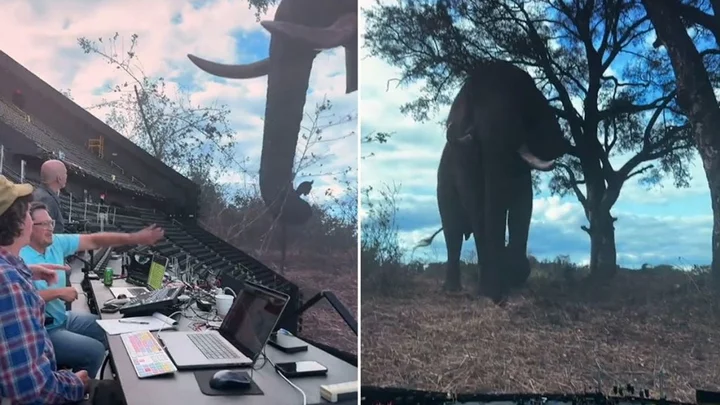
A look inside the Las Vegas Sphere containing the 'largest screen on Earth' and 160,000 speakers
US filmmaker Darren Aronofsky has shared a spectacular glimpse inside the Las Vegas Sphere, ahead of his film's opening there on 6 October. The Sphere contains the 'largest screen on Earth' and has 160,000 speakers, which will play his film 'Postcard From Earth', which celebrates the natural beauty of the planet. “At times you forget where you are,” Aronofsky says. In the clip, a huge elephant can be seen towering over him, giving a full 360-degree experience. Sign up to our free Indy100 weekly newsletter
2023-09-13 23:22
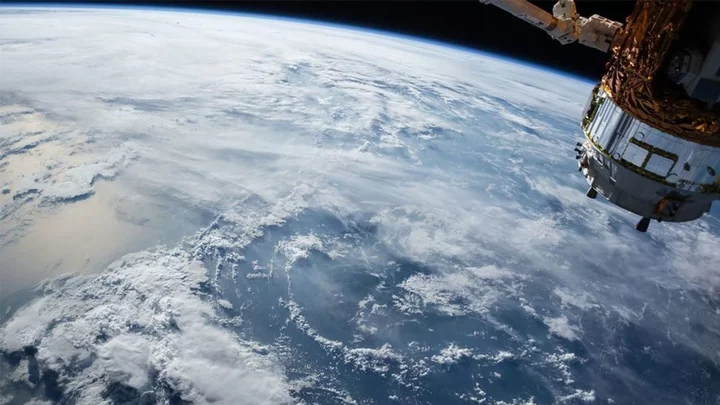
Two ancient humans become astronauts after being blasted into space
Space travel might be a relatively modern phenomenon, but a pair of ancient human ancestors are getting to experience it too – albeit two million years after their death. The remains of a hominin species called Australopithecus sediba which date back two million years have been blasted into space as part of the Virgin Galactic’s spaceship, VSS Unity. The remains of a 250,000-year-old species named Homo naledi was also included in the craft, which was sent into space on September 8. Bone fragments from the two ancient skeletons were taken into orbit by Professor Lee Berger. They reached a height of around 50,000 feet by the VMS Eve mothership before being separated from the VSS Unity spaceship. Berger said: “The journey of these fossils into space represents humankind’s appreciation of the contribution of all of humanity’s ancestors and our ancient relatives. “Without their invention of technologies such as fire and tools, and their contribution to the evolution of the contemporary human mind, such extraordinary endeavors as spaceflight would not have happened.” Berger’s son, Matthew Berger, who was a part of the discovery of the remains as a child went on to explain the significance of the unusual cargo, saying: “These fossils represent individuals who lived and died hundreds of thousands of years ago, yet were individuals who likely gazed up at the stars in wonder, much as we do,” “I imagine they never could have dreamed while alive of taking such an incredible journey as ambassadors of all of humankind’s ancestors.” Sign up for our free Indy100 weekly newsletter Have your say in our news democracy. Click the upvote icon at the top of the page to help raise this article through the indy100 rankings
2023-09-13 20:46
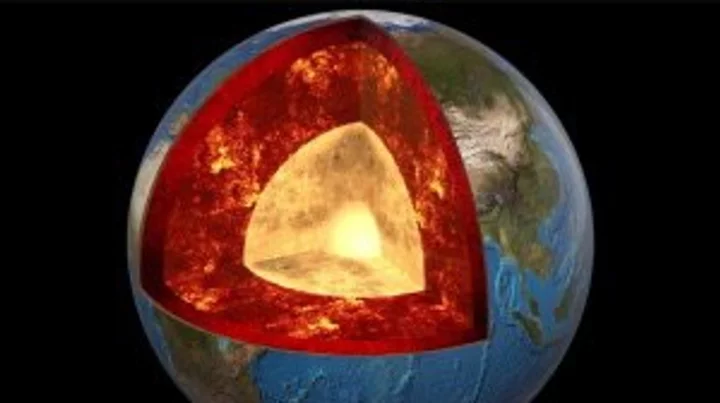
Science news - live: Hidden oceans and moon structures discovered
It feels like this year, more than any other, we’re seeing a stream of science stories that continue to blow our minds. Every day is a school day online in 2023, and a host of studies, research papers and headline-making breakthroughs have completely changed our understanding of the world around us at every turn. There have been missions to the moon and findings about our planet which could turn everything we thought we knew on its head – not to mention baffling hearings on UFOs taking place in the US congress. These are the biggest science stories so far this year that have caught our attention in a big way. 'Alien corpses' unveiled in Mexico divide conspiracy theorists Christmas has come early for UFO watchers, with the alleged corpses of real-life aliens displayed for the world to see. The startling revelation came during a congress hearing in Mexico City on Tuesday, titled the Public Assembly for the Regulation of Unidentified Anomalous Aerial Phenomena (UAP). During the session, which was streamed online, Mexican ufologist Jaime Maussan presented what he claimed were two perfectly preserved “non-human entities”. Read more here. Buy now , Massive ocean discovered beneath the Earth's crust containing more water than on the surface People are only just realising that there’s a massive ocean hidden under the Earth’s crust. It turns out there’s a huge supply of water 400 miles underground stored in rock known as 'ringwoodite'. Scientists previously discovered that water is stored inside mantle rock in a sponge-like state, which isn’t a liquid, solid or a gas, but instead a fourth state. Read more here. Buy now , Sign up for our free Indy100 weekly newsletter Have your say in our news democracy. Click the upvote icon at the top of the page to help raise this article through the indy100 rankings
2023-09-13 19:25
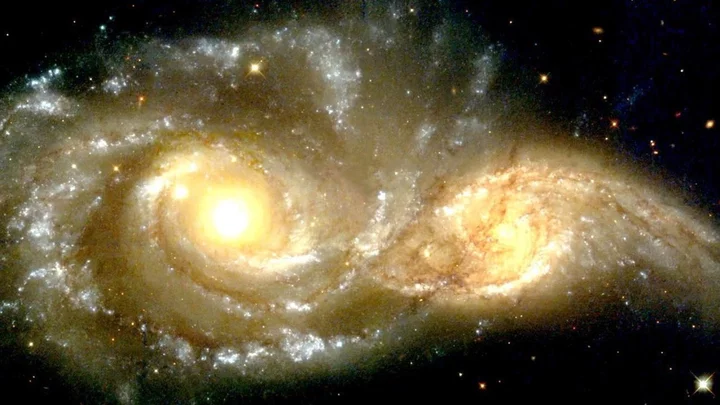
Scientists discover new Black holes that could be creeping up on Earth
A new study has revealed that black holes could be lurking much closer to Earth than anticipated. A black hole in space is when "gravity pulls so much that even light can not get out," NASA explains. "The gravity is so strong because matter has been squeezed into a tiny space. This can happen when a star is dying." Due to no light being present, they are invisible. Only special tools can pick up on them. There are said to be around 10 million to 1 billion mass black holes in the Milky Way, according to Science Alert. However, astrologers only know of about 20 of them. Now, a recent study has revealed that they could be a lot closer to Earth than previously thought after investigating the Hyades cluster, "a group of stars located 150 light-years away". In a statement, astrophysicist Stefano Torniamenti of the University of Padua explained: "Our simulations can only simultaneously match the mass and size of the Hyades if some black holes are present at the centre of the cluster today (or until recently). The Hyades with hundreds of stars is said to be approximately 625 million years old. Due to its packed environment, "higher rates of collisions and mergers" are expected. At 153 light-years away, it is considered the closest star cluster to Earth. Researchers were able to observe two or three black holes in the Hyades, which are either still present or ejected less than 150 million years ago and hovering around the outskirts. "This observation helps us understand how the presence of black holes affects the evolution of star clusters and how star clusters in turn contribute to gravitational wave sources," Professor Mark Gieles of the University of Barcelona said. Sign up for our free Indy100 weekly newsletter Have your say in our news democracy. Click the upvote icon at the top of the page to help raise this article through the indy100 rankings.
2023-09-12 22:47
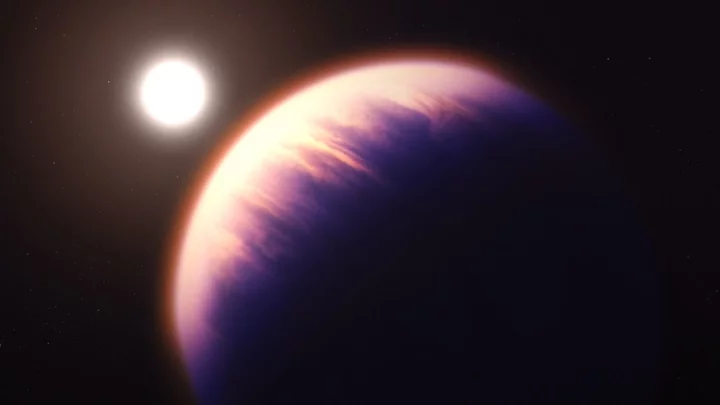
Scientists discover huge exoplanet 120 light years from Earth that ‘could contain signs of life’
An exoplanet more than eight times the size of Earth and potentially habitable has been discovered by scientists. Exoplanet K2-18 b was detected by NASA’s James Webb Space Telescope and piqued scientists’ interest after data suggested it may be covered in an ocean and have a hydrogen-rich atmosphere that could support life. Scientists are also encouraged by a hint of the detection of the molecule dimethyl sulphide (DMS). On Earth, DMS is only produced by microbial life, but the team has yet to confirm the detection and search for evidence of biological activity. The groundbreaking discovery of K2-18 b may see the exoplanet come under the unique classification of a “Hycean” planet – ones which are candidates for life thanks to their hydrogen-rich atmospheres and water cover. The amount of methane and carbon dioxide combined with the shortage of ammonia suggests there may be a water ocean underneath a hydrogen-rich atmosphere in K2-18 b. K2-18 b lies within the constellation of Leo and orbits a dwarf star called K2-18. It lies around 120 light years away from Earth and is within the habitable zone. However, scientists added that this does not necessarily mean it can support life. Nikku Madhusudhan, an astronomer at the University of Cambridge and lead author of the paper, explained: “Our findings underscore the importance of considering diverse habitable environments in the search for life elsewhere. “Traditionally, the search for life on exoplanets has focused primarily on smaller rocky planets, but the larger Hycean worlds are significantly more conducive to atmospheric observations.” Sign up to our free Indy100 weekly newsletter Have your say in our news democracy. Click the upvote icon at the top of the page to help raise this article through the indy100 rankings.
2023-09-12 17:23
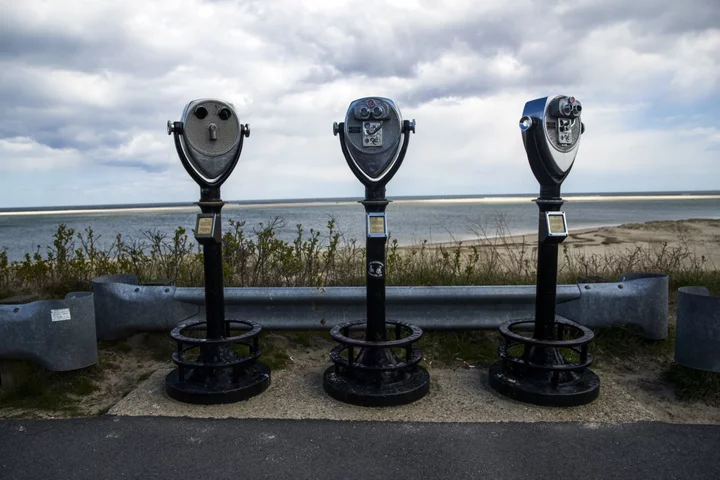
Hurricane Lee Seen Heading Toward Cape Cod: Weather Watch
Hurricane Lee has grown back into a Category 3 storm with 120-mile-per-hour winds about 650 miles (1,046 kilometers)
2023-09-12 04:52
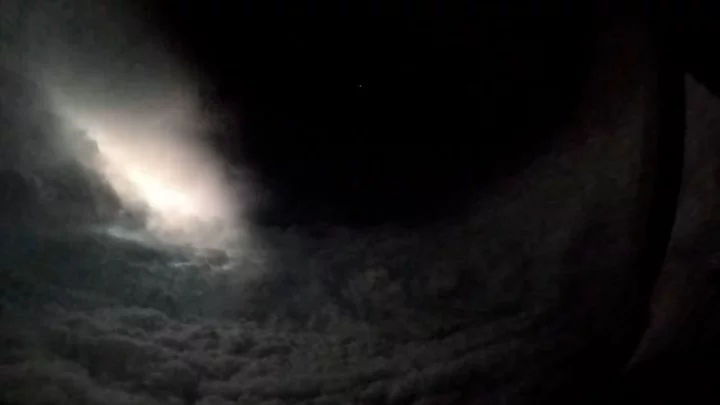
Storm chasers capture frightening footage from inside Hurricane Lee
Storm chasers filmed the inside of a hurricane and it looks just as terrifying as you might imagine it would. The footage taken from inside the eye of Hurricane Lee was captured on Friday (8 September) as the storm moved over the Atlantic Ocean. The video taken shows lightning striking inside the Category 4 hurricane, illuminating the cloud wall around it and with the black eye overhead. The stunning clip was captured by the U.S. Air Force Reserve's 53rd Weather Reconnaissance Squadron in Biloxi, Mississippi. They are affectionately known as the “Hurricane Hunters”. As a Category 4 storm, Hurricane Lee has sustained winds of between 130 to 156 mph. The storm was located off the coast of Puerto Rico and was forecast to move northwards. The footage was able to be captured thanks to the squadron’s WC-130J Hercules aircraft. These planes are specifically designed for flying weather reconnaissance and have equipment onboard including sensors and instruments to measure the profile of a hurricane’s wind, temperature and pressure. The Hercules aircraft can stay airborne for up to 18 hours ensuring the crew onboard can record the weather data over a long time period. In a statement released by the U.S. National Oceanic and Atmospheric Administration's (NOAA) National Hurricane Center, they were unable to determine what the impact of the storm might be on the country’s eastern coast yet. The statement read: “It remains too soon to know what level of impacts, if any, Lee might have along the U.S. East Coast and Atlantic Canada late this week.” Hurricane Lee is the fourth hurricane to be recorded during the 2023 Atlantic hurricane season, along with nine other named storms. Sign up to our free Indy100 weekly newsletter Have your say in our news democracy. Click the upvote icon at the top of the page to help raise this article through the indy100 rankings.
2023-09-11 23:25
